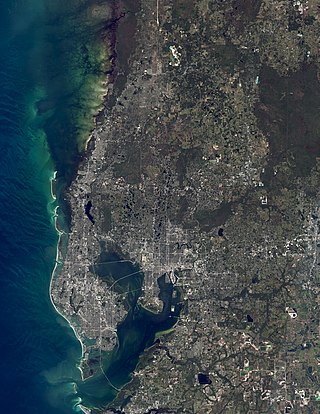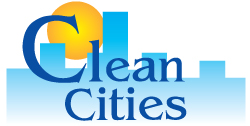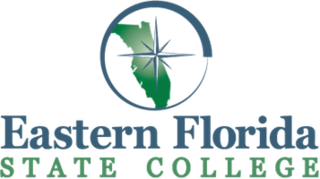Related Research Articles

Pine Hills is a census-designated place (CDP) and unincorporated subdivision in Orange County, Florida, United States, west of Orlando. Per the 2020 U.S. Census, the population was 66,111. It is a part of the Orlando–Kissimmee–Sanford, Florida Metropolitan Statistical Area.

The University of Central Florida (UCF) is a public research university with its main campus in unincorporated Orange County, Florida. UCF also has nine smaller regional campuses throughout central Florida. It is part of the State University System of Florida. With 68,442 students as of the Fall 2022 semester, UCF has the second-largest student body of any public university in the United States. UCF is classified among "R1: Doctoral Universities – Very high research activity" and is accredited by the Commission on Colleges of the Southern Association of Colleges and Schools.

The Tampa Bay area is a major metropolitan area surrounding Tampa Bay on the Gulf Coast of Florida in the United States. It includes the main cities of Tampa, St. Petersburg, and Clearwater. It is the 18th-largest metropolitan area in the United States, with a population of 3,175,275 as of the 2020 U.S. Census.
SEMI is an industry association comprising companies involved in the electronics design and manufacturing supply chain. They provide equipment, materials and services for the manufacture of semiconductors, photovoltaic panels, LED and flat panel displays, micro-electromechanical systems (MEMS), printed and flexible electronics, and related micro and nano-technologies.
The Central Florida Research Park (CFRP) is a research park abutting the main campus of the University of Central Florida (UCF) in Orlando, Florida, United States. CFRP is the largest research park in Florida, the fourth largest in the United States by number of companies, and the seventh largest in the United States by number of employees. CFRP is home to numerous centers hosted by the United States Department of Defense, UCF, and private corporations.

SEMATECH is a not-for-profit consortium that performs research and development to advance chip manufacturing. SEMATECH has broad engagement with various sectors of the R&D community, including chipmakers, equipment and material suppliers, universities, research institutes, and government partners. The group is funded by member dues.
The Innovation Way Corridor is a development area planned for Orlando, Florida. The planned corridor is to stretch south from the University of Central Florida to International Corporate Park, then West towards the Lake Nona area and finally ending at the Orlando International Airport. At the heart of this development plan is the expansion and extension of Alafaya Trail south from Avalon Park to SR 528 running between the county landfill and the OUC Curtis H. Stanton Energy Center, then continuing through International Corporate Park before it curves west towards the Lake Nona area and the airport. The entire corridor is planned to be approximately 17 miles (27 km) long. The heart of the planned project is to create a technological and business corridor linking the University of Central Florida to the Orlando International Airport.

The Florida Interactive Entertainment Academy (FIEA) is a graduate school of the College of Arts and Humanities at the University of Central Florida located in Orlando, Florida, United States. The director of the school is Ben Noel, former vice president and chief operating officer of EA's Orlando-based Tiburon studio.

The Rosen College of Hospitality Management is an academic college of the University of Central Florida located in Orlando, Florida, United States.

The Clean Cities Coalition Network is a coordinated group of nearly 100 coalitions in the United States working in communities across the country to advance affordable, domestic transportation fuels, energy efficient mobility systems, and other fuel-saving technologies and practices. The U.S. Department of Energy’s Office of Energy Efficiency and Renewable Energy’s Vehicle Technologies Office facilitates national coordination of the coalitions through its Technology Integration Program. The Network consists of 79 coalitions that work with more than 15,000 local stakeholders that have helped shift nearly 10 billion gasoline gallon equivalents of conventional fuel to alternative fuels or energy efficiency improvements, put more than 1.1 million alternative fuel vehicles on the road, and contributed to the expansion of alternative fueling station infrastructure since 1993. As of early 2020, there were more than 29,000 fueling stations nationwide that provide at least one of the following alternative fuels: ethanol (E85), biodiesel, compressed natural gas, electric, hydrogen, liquefied natural gas, renewable natural gas, or propane.

The University of Central Florida College of Engineering and Computer Science is an academic college of the University of Central Florida located in Orlando, Florida, United States. The college offers degrees in engineering, computer science and management systems, and houses UCF's Department of Electrical Engineering and Computer Science. The dean of the college is Michael Georgiopoulos, Ph.D.

The University of Central Florida College of Medicine is an academic college of the University of Central Florida located in Orlando, Florida, United States. The VP of Health Affairs and dean of the college is Deborah C. German, M.D.

The University of Central Florida College of Optics and Photonics is an academic college of the University of Central Florida located in Orlando, Florida, United States. The dean of the college is David J. Hagan, Ph.D.
The UCF Institute for Economic Forecasting (IEF) is an economic research institute of the College of Business Administration at the University of Central Florida located in Orlando, Florida, United States. The director of the institute is Sean Snaith.
The University of Central Florida is a metropolitan public research university located on a 1,415-acre (5.73 km2) main campus in Orlando, Florida, United States. UCF is a member institution of the State University System of Florida and is the second-largest university in the United States.
The Florida Rural Broadband Alliance LLC, abbreviated FRBA, was a limited liability corporation established to deploy broadband Internet services in rural parts of Florida. It filed for bankruptcy in 2016.

Eastern Florida State College, formerly Brevard Community College, is a public college in Brevard County, Florida. It is a member of the Florida College System and has campuses in Cocoa, Melbourne, Palm Bay, and Titusville, as well as a Virtual Campus.
Culture Biosystems, originally known as Culture Fuels, Inc., is a privately owned renewable energy company in the United States. Its technology provides a cultivation platform for large-scale production of algae for conversion into diesel and aviation fuel. Its products provide a hybrid algae cultivation system alternative to open ponds and closed photobioreactors.
SkyWater Technology is an American semiconductor engineering and fabrication foundry, based in Bloomington, Minnesota. It is the only US-owned pure-play silicon foundry.

The CHIPS and Science Act is a U.S. federal statute enacted by the 117th United States Congress and signed into law by President Joe Biden on August 9, 2022. The act provides roughly $280 billion in new funding to boost domestic research and manufacturing of semiconductors in the United States. The act includes $39 billion in subsidies for chip manufacturing on US soil along with 25% investment tax credits for costs of manufacturing equipment, and $13 billion for semiconductor research and workforce training, with the primary aim of countering China.
References
- ↑ "Technology: Local council's grant program wins award". Orlando Sentinel. Retrieved September 19, 2010.
- ↑ "Florida High Tech Corridor Council to Receive Award at Economic Development Conference".
- ↑ "High Tech Corridor Council Scores National Recognition". Florida Technology Journal. Archived from the original on September 16, 2012. Retrieved September 15, 2011.
- ↑ "Matching Grants Research Program".
- ↑ "High Tech Corridor matching grants create billion-dollar economic engine". Tampa Bay Business Journal. September 30, 2011.
- ↑ Soderstrom, Alex (10 November 2021). "New program to facilitate growth at Central Florida businesses operating in high-tech 'clusters'". www.bizjournals.com. Retrieved 2022-03-31.
- ↑ "Florida High Tech Corridor: Publications".
- ↑ "Community: Florida High Tech Corridor, USA". Intelligent Community Forum. Archived from the original on May 22, 2015. Retrieved January 1, 2002.
- ↑ "Research Report: Florida's High Tech Corridor: Opening the Door to Florida's Future Interim Report to the Florida Office of Tourism, Trade and Economic Development" (PDF). Florida TaxWatch. Retrieved September 13, 2012.
- ↑ Uimonen, Terho; Guth, Rob (November 1995). "Singapore wooing semi companies". Electronic News. 41 (2092): 64. Archived from the original on 2012-09-16.
- ↑ "Cirent Plots Course For Next Expansion". Orlando Sentinel. May 5, 1998.
- ↑ "The University of Florida has joined the Florida High Tech Corridor Council as a full partner". Florida Trend. March 1, 2005.